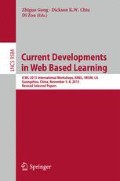Abstract
The hybrid learning exploited as a tool supporting the face-to-face form of instruction started to be implemented in this process two decades ago. Providing a wide rate of tools and strategies to each student, the information and communication technologies make efforts to support efficient learning. As a result students are positively motivated and able to develop their level of knowledge in the shortest time period spending least efforts. To reach such a level in the real process of instruction, the requirement for optimizing the teaching/learning arose, particularly the call for improving the flexibility of the process, mainly by applying the individualized approach.
Access this chapter
Tax calculation will be finalised at checkout
Purchases are for personal use only
References
Hybrid Learning, University of Washington – Bothell (2015). http://www.uwb.edu/learningtech/elearning/hybrid-and-online-learning/hybrid-learning/about-hybrid-learning/definition-hybrid-learning
Porter, W.W., Graham, C.R., Spring, K.A., Welch, K.R.: Blended learning in higher education: institutional adoption and implementation. Comput. Edu. 75(6), 185–193 (2013)
Frydrychova Klimova, B., Poulova, P.: Forms of instruction and students’ preferences - a comparative study. In: Cheung, S.K., Fong, J., Zhang, J., Kwan, R., Kwok, L.F. (eds.) ICHL 2014. LNCS, vol. 8595, pp. 220–231. Springer, Heidelberg (2014)
Poulova, P., Simonova, I.: Borderless education: InterUniversity study – successful students’ feedback. In: Cheung, S.K., Fong, J., Zhang, J., Kwan, R., Kwok, L.F. (eds.) ICHL 2014. LNCS, vol. 8595, pp. 232–242. Springer, Heidelberg (2014)
Poulova, P., Simonova, I.: Flexible e-learning: online courses tailored to student’s needs. In: Proceedings of the 9th International Scientific Conference on Distance Learning in Applied Informatics (DIVAI 2012), Nitra, UKF, pp. 251–260 (2012)
Felder, R.M.: Are learning styles invalid? (Hint: No!) (2010). http://www4.ncsu.edu/unity/lockers/users/f/felder/public/Papers/LS_Validity(On-Course).pdf
Gregorc, A.: Gregorc’s mind styles (2004). http://www.colorfulleadership.info/papers/concrete.htm
Mitchell, D.P.: Learning Style: A Critical Analysis of the Concept and Its Assessment. Kogan Page, London (1994)
Coffield, F., et al.: Learning styles and pedagogy in post-16 learning. A systematic and critical review. Newcatle University report on learning styles (2004). http://www.Isda.org.uk/files/PDF/1543.pdf
Mareš, J.: Styly učení žáků a student (Learning Styles of Pupils and Students). Portál, Praha (1998)
Mareš, J. e-Learning a individuální styly učení. Československá psychologie [e-Learning and Individual Learning Styles], vol. 48, no. 3 (2004)
Honey, P. Learning styles – the key to personalised e-learning? (2010). http://www.bbmatters.net/bbmatters…/Learning%20stylespeter%20honey.pdf
Johnston, C.A.: Unlocking the will to Learn. Corwin Press, Inc., Thousand Oaks (1996)
Poulová, P., Šimonová, I.: Didactic Reflection of Learning Preferences in IT and Managerial Fields of Study, Information Technology Based Higher Education and Training (ITHET 2013). IEEE, Piscataway (2013)
Šimonová, I., Poulová, P.: Learning Style Reflection within Tertiary e-Education. Hradec Kralove, Wamak (2012)
Šimonová, I., Poulová, P., Sokolová, M.: Klíčové kompetence a jejich reflexe v terciárním e-vzdělávání [Key Competences and Their Reflection in Tertiary e-Education]. M&V Publishers, Hradec Kralove (2011)
Šimonová, I., Poulová, P.: Cloud computing in higher education exploiting social networks and mobile devices (published)
Churches, A.: Bloom’s digital taxonomy. http://edorigami.wikispaces.com/Bloom%27s+Digital+Taxonomy
Prensky, M. Digital Natives, Digital Immigrants, On the Horizon, vol. 9, no. 5. MCB University Press (2001)
Acknowledgments
The paper is supported by the project ‘Didactic aspects of Blackboard Mobile Learn implementation into the process of instruction at FIM.’
Author information
Authors and Affiliations
Corresponding author
Editor information
Editors and Affiliations
Rights and permissions
Copyright information
© 2016 Springer International Publishing Switzerland
About this paper
Cite this paper
Simonova, I., Poulova, P. (2016). e-Learning in Practice: Tracking Students’ Performance. In: Gong, Z., Chiu, D., Zou, D. (eds) Current Developments in Web Based Learning. ICWL 2015. Lecture Notes in Computer Science(), vol 9584. Springer, Cham. https://doi.org/10.1007/978-3-319-32865-2_9
Download citation
DOI: https://doi.org/10.1007/978-3-319-32865-2_9
Published:
Publisher Name: Springer, Cham
Print ISBN: 978-3-319-32864-5
Online ISBN: 978-3-319-32865-2
eBook Packages: Computer ScienceComputer Science (R0)

